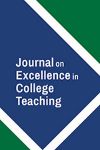- Home /
- Center for Teaching Excellence /
- Journal on Excellence in College Teaching /
- Journal on Excellence in College Teaching, Volume 6, Number 3
You have no items in your shopping cart.
Categories
- Project Dragonfly
- Institute for Food
- Department of Accountancy
- Miami University Police Department
- Missoula Children's Theatre Drama
- AIAA Miami University Branch
- GLI Passport Services
- Miami Club Sports
- Youth Gymnastics
- TLC CLEP Testing
- Advancing Women in Entrepreneurship
- African Student Union
- Alpha Kappa Delta
- Alpha Kappa Psi
- Alpha Phi Omega Zeta Delta
- Miami University Law Fair
- Kappa Kappa Psi
- Alpha Rho Chi
- Miami University Weightlifting Club
- Engineers without Borders
- Tau Beta Pi
- Center for Teaching Excellence
- Gardner-Harvey Library
- Miami E Sports Camp
- The Miami Student
- Paws for a Cause
- Phi Chi Theta
- Delta Epsilon Mu
- Pi Sigma Epsilon
- Miami University Psychology Clinic Online
- Sigma Lota Rho
- Miami University TAPPI Professionals
- Finding Freedom Summer Traveling Panel Exhibit
- Sigma Tau Delta
- Phi Sigma Pi
- Psi Chi: The International Honor Society in Psychology
- Theta Tau
- Society For Human Resources Management Miami University
- Regional Campuses Global Program
- Miami University Department of Architecture and Interior Design
- Mathematics Department
- Delta Sigma Pi
- WMSR Redhawk Radio
- Amicus Curiae Pre-Law Society
- The Helm - NROTC
- Nu Rho Psi
- Printmaking Art Supplies
- Miami University Climbing Club
- Pre Physical and Occupational Therapy Club
- Miami University Hip Hop Crew
- Dance Theatre
- Miami Cornhole Club
- Ohio Collegiate Music Education Association (OCMEA)
- Fashion Design & Merchandising
- Phi Delta Epsilon Medical Fraternity
- Miami University Geological Society
- MU Ballroom Dance Club
- Mock Trial
- Miami University Archery Club
- Zeta Rho
- Women in Business
- Miami Dance Corps
- Epsilon Tau Pi
- Miami MED
- Pre-Dentistry Club
- Ox-Wee (Oxford Empowering the Otwee-Miami School of Hope)
- Presidential Fellows Project
- Honors Student Advisory Board (HSAB)
- Southwest Ohio Regional College Fair
- Student Academy of Nutrition and Dietetics
- Futures in Retail
- Inklings
- National Society of Black Engineers
- Zeta Phi Beta Sorority Inc.
- Pi Sigma Epsilon
- INCS Conference 2024
- Department of Art
- Miami University Real Estate Club
- UP Magazine
- Miami University Fighters Guild
- JECT Subscriptions
- Center for Student Engagement Activities and Leadership
- MU XY-Axis Club
- Alternative Spring Break Organization
- Miami University Wind Ensemble
- Best Buddies
- Department of Music
- Exercise is Medicine
- Miami Chemical Society
- Guitar Club of Miami
- Kappa Delta Pi Nu Chapter
- Center of Excellence for Prevention & Early Intervention
- Miami Catering
- McGuffey House and Museum
- Miami University Men's Glee Club
- Career Center
- Athletic Facility Rentals
- Kappa Alpha Pi
- Office of Residence Life
- Miami University Phillips Art Center
- Healthcare Sales Organization
- ICA Cheer Clinics
- Willard Sherman Turrell Herbarium
- Sport Analytics Club
- Women in Sport Leadership Club
- College of Creative Arts
- Phi Gamma Nu
- Miami University XR Lab and Stage
- Miami University Golf Club
- The History Department
- Chemistry and Biochemistry Department
- Miami OH Bass Fishing
- Panhellenic Association
- National Student Speech & Hearing (NSSLHA)
- Hiestand Galleries, Miami University 2025 Young Sculptors Competition, College of Creative Arts
- Miami University Varsity Synchronized Skating
- Ohio Slate User Conference
- Women Impacting Supply Chain Excellence (WISE)
- Consortium for the Study of Leadership and Ethics in Education (CSLEE)
- Supply Chain Management Association
- Department of Finance
- Multicultural Business Association
- Office of ASPIRE
- Women in Law
- Miami University Symphony Orchestra
- Campus Kids
- American Choral Directors Association
- Miami Oxford Student Nursing Association
- Student Leadership and Management Club (SLAM Club)
- Student National Association of Teachers of Singing (SNATS)
- Miami University Society of Women Engineers
My Account
Copyright © 2026 Miami University. All rights reserved.





































































